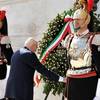Washington, June 2. Italian National Day. Speech by Amb. Giulio Terzi di Sant'Agata
Distinguished Authorities, Ladies and Gentlemen, dear Friends,
thank to all of you for coming here at the Embassy of Italy to celebrate our National Day and a special thanks to our sponsors.
My sincere appreciation goes to the Guglielmo Marconi School of New York, to its Principal, Ms. Fiore, to the wonderful choir and its Director, Mrs.
Their presence, tonight, is testimony of the strong engagement of all Italian institutions, and all Italian American communities in promoting education and the teaching of Italian, in American schools and universities.
The National Security Strategy launched last week by President Obama has, among its priorities, education and teaching of foreign languages. [and I quote: “We will support programs that cultivate interest and scholarship in foreign languages and intercultural affairs, including exchange programs”].
Italian is the only European language on the rise in the
the importance of the Italian-American communities; the large dimension of exchanges already in place between Italian and US universities; and
the attraction shown by the Italian language. All this proves the opportunities that we must seize now, in promoting our language in the
June 2nd is the day when we remember and celebrate the historical step which the Italian people made through a referendum, which established our new form of government, just after coming out of a tragic war, a repressive dictatorship and a foreign occupation.
After World War II the time had thus come to have a Constitution democratically voted for, and legitimized, by the whole nation. As the President of the Republic, Giorgio Napolitano, said on the occasion of the 60th anniversary of the Constitution two years ago, this fundamental Charter had to express both “constitutional unity” and the “foundation of national unity”.
Three connected aspects of an all encompassing moment of national unity did mark, therefore, the refounding and the renaissance of our national identity:
the June 1946 referendum;
the election of the constituent assembly; and
the adoption of the Constitution in December 1947.
Refounding and renaissance of
They certainly did not mean either a fracture or a refusal of the extraordinary process which had led to the Unity of Italy.
Next year we will celebrate throughout the
A closely-knit network of cultural and human relations which have developed from the Declaration of Independence, and the American Constitution, onwards.
Throughout
As an example, let me mention the constitutional amendments to enable Italian citizens abroad to vote at the political elections.
Secondly, the amendments to assure full "compliance with all the obligations deriving from European laws": a further demonstration of our commitment to the integration of the European union, of which Italy has been one of the six founding members and a constant, tireless supporter.
I wished to dwell on these two aspects on this important occasion, in order to show how current and symbolic the meaning, and the message, of June 2nd is today. Indeed, its message, its appeal to uphold and support the fundamental values of our Constitutions is, today, more alive than ever.



































i-Italy
Facebook
Google+
This work may not be reproduced, in whole or in part, without prior written permission.
Questo lavoro non può essere riprodotto, in tutto o in parte, senza permesso scritto.